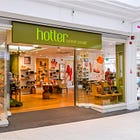Back in July I wrote about the helter-skelter journey of Hotter Shoes from apparently hugely successful and growing business to a prepack administration in what seemed like the blink of an eye.
This week brought a reminder of another odd story in the recent history of retailing, and one which is still unfolding before our eyes.
In 2015 Majestic, favourite wine merchant of the middle classes, announced it was buying Naked Wines, an online retailer with quite a different model involving ‘angels’ (that’s customers to you and I) getting direct access to winemakers around the world. The logic was obvious - Naked would bring a funky online edge to what had been a very store-based retailer just a time when every retail analyst was singing the praises of multi-channel and omni-channel strategies.
What followed over the next few years can only be described as a reverse-takeover. Naked’s management took charge of the overall business, made very clear that they regarded the store estate as the slow-growth poor cousin and eventually sold all of the stores and the Majestic brand to a private equity investor for about £100m in 2019. What had originally been the Majestic PLC business became Naked Wines PLC and set about delivering its strategy of international growth using the healthy cash proceeds from the store sale.
Such a radical moving around of the bits and pieces of the business gives us a fascinating learning opportunity. How has the zippy online business done now that it isn’t burdened with all those stores? And conversely, how has the stores business done without the secret sauce of the Naked model?
The results might surprise you (unless you’ve spotted the slightly sarcastic tone in the last paragraph, of course).
Majestic has gone from strength to strength, opening new stores at a rate of knots, hiring new colleagues and by all accounts thriving under its new owners and under the guidance of a terrific leadership team.
And as for Naked? This year has seen delayed publication of results (which finally came out this week), an ominous note from the auditors about “material uncertainty related to going concern” and a share price responding in an unsurprising way. The entire business is now worth about half as much as the amount it sold the Majestic store estate for and has burned more than £70m in negative operating cash flow over the last 2 years.
So what is the lesson to draw from all of this?
There are clearly implications in the contrasting fortunes of Majestic and Naked for investors, advisors and those who sit on Boards of directors and make decisions about strategy. A cynic would suggest, for example, that selling an asset for £100m in order to invest that money in turning a small unprofitable business into a bigger unprofitable business might not have been the idea of the century.
There is also, though, food for thought in this story for anyone thinking about the prospects for their own retail or consumer business. It would be a mistake to conclude, for example, that this story tells you simply that ‘stores are good and online is bad’ - that’s patently ridiculous. Indeed, the Majestic business has made significant investments in its own online business since separating from Naked and no doubt regards that channel as an important part of its overall customer offering.
Naked’s troubles also don’t prove that a pureplay online business can’t work - there are plenty in other sectors doing much better.
I do think, though, that this wine-industry story illustrates something important about how we relate to brands. During Covid lockdowns pureplay businesses did very well for the not-entirely-surprising reason that stores were closed, and some more myopic forecasters concluded then that pureplays were the only way forward.
As the world went back to some kind of normal, however, customers flocked back to stores and the percentage of retail sales done through online reverted back to something that looked a bit more like the previous trendline.
That apparently came as something of a shock to stock market investors (just look at the Naked share price shoot up in 2020 and back down since for evidence of that), but for those of us who think about how customers shop the reversion was less surprising.
Notably, the conspicuous winners in retailing today are those who do both online and store executions well, and are good at delivering a seamless customer experience regardless of channel.
And that’s the real lesson from this story, I think - as online businesses begin to open stores and retailers continue to develop their omnichannel offerings, it is, as it ever has been, the best customer experience that wins.
A store estate can play a huge part in that customer experience - just ask the nice people in your local Majestic.





A very interesting case indeed, but one that is not just about channel dynamics but also about brands and customers. The stronger equity clearly rested with Majestic, and the restoration of the brand and its proposition has motivated consumers.
100% agree Ian. Majestic provides a great in store experience with some very knowledgeable staff and value for money product. Key basics in their sector. As a previous ‘angel’ I came to the conclusion that the offer was too good to be true (exclusive wines at half the price it should be charging). In my opinion the best retailer is winning here.